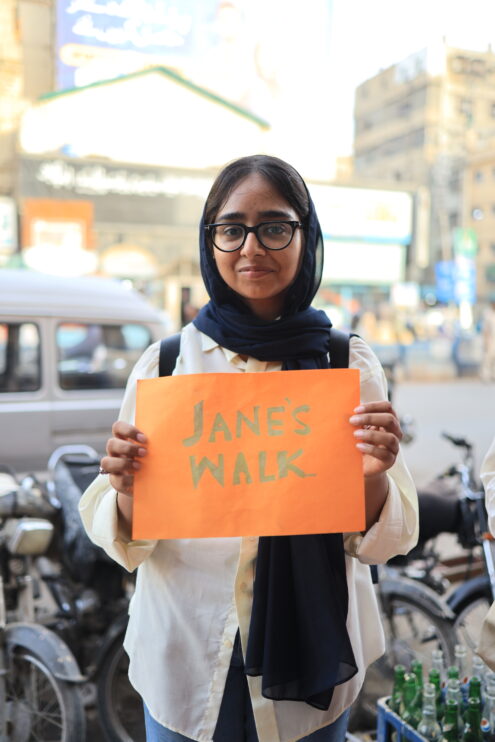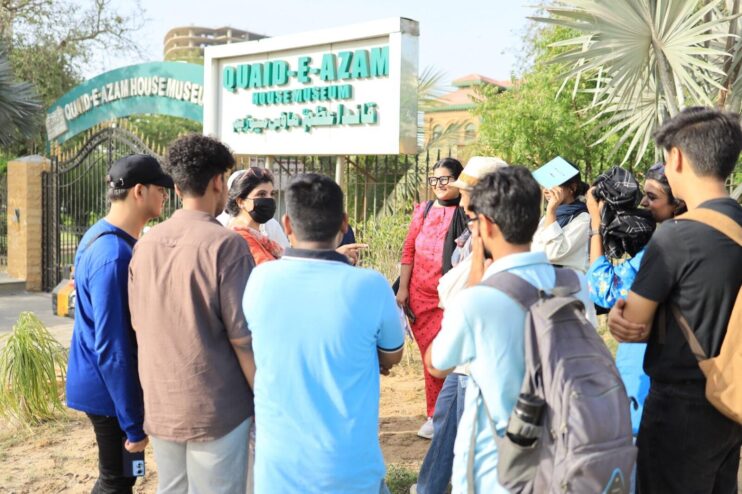Submitted by Ayesha Aslam | 07/2025

A community led walk to explore who the roads are meant for
Certainly, not the one going on foot.
Janes Walk is a community led walk hosted every May to honour urban activist and writer Janes Jacob who believed walking is the best way to understand a city.
This global walking festival started in 2007, and has been to the neighborhoods of New York, Melbourne, Munich, Venice, St. Petersburg, Birmingham and several other cities before making its debut to Karachi this year with “Pehla Qadam- Claiming Space, Together”.
“Pehla Qadam” translates into ‘first step’ in English, denoting its inaugural in Karachi. The agenda for Janes Walk is flexible worldwide, for west it’s exploring the neighborhoods but the focus shifts to inclusivity in the east.
Walking is more than just movement, it’s immersing oneself in the environment, noticing the unnoticed and connecting with the street life activities in a different way. This year’s theme walking in STEP (Story, Transport, Ecology, Place) sought to reclaim walking as an empowering, inclusive, and joyful activity, one that reconnects us with our environments, nature, history, and one another.
“The power of Jane’s Walk lies really in the power of the people,” says Celia Beketa, Jane’s Walk Global Co-Chair. “We can build trust, connection and a sense of belonging – all from the simple act of walking conversations.”
A vigorous five mile walk will do more good for an unhappy but otherwise healthy adult than all the medicine and psychology in the world, quotes Paul Dudley White. The fact that such a highly beneficial form of exercise is so unpopular needs to be looked into. Is it the inactive lifestyle where you can summon a car with a few taps on your phone or the urban infrastructure of the city that’s designed for cars only? The Community Walk ‘Pehla Qadam’, probed into this using walking not just as a mode of commute but also a means to socialise and connect with the city. The route was mapped out, shedding light on the history, communities and street economy on the roadsides. Participants marched from Frere Hall to Empress Market to explore what Karachi has to offer to the walking crowd and how walk friendly the roads, pavements and lack thereof are.
Speaking to people side by side on the street revisiting culture and history of the places. Photo by a participant Ahmed Adil
Following the adage where there is a will, there’s a way, the group passed through streets that weren’t pedestrian friendly, roads with no zebra crossings and sideways invaded to the point passing felt trespassing. The communal walk fostered civic dialogue and critical interrogation, highlighting the challenges such as usability, accessibility and safety, diverse people face navigating these spaces.
Walking fosters a deeper connection with the city. This hits home once you walk these streets with no shade and broken pavements in the sweltering heat. Is this why our relationship with walking is dying a slow death? “Earlier, we would take a 5 min stroll to the stop to catch a bus but with private ride hailing services, now we trade those 5 minutes of walk for convenience”, said Samia Sarfaraz, an urban planner from Karachi.
Personal perception influences walking behaviour rather infrastructure. Convenience culture and security disrupt the pleasure of strolling or loitering. Most participants leaned towards the state of security that’s in shambles in the city. ‘Security is the biggest concern, I don’t mind paying extra just to make sure I get through shady areas safe and secure’, shared Amjad Hussain, a Sales Manager from Karachi.
Mohtisham Saqib, a student from Karachi, reminisced, “I used to live nearby and my grandmother (daadi) would take me to Bolton for groceries and stuff. Walking was a part of life as a kid, but then we stopped, I don’t recall why, but we did. This experience reminded me of the old times and the fact we should walk often.”
“This was a learning experience as it introduced me to history I wasn’t previously aware of. It was a reiteration of what walking in most areas of Karachi is with encroachment, potholes, chaotic traffic and a blatant lack of planning. When you explore an area on ground, you realize what grassroots solutions can be implemented to make a space people centric. Hence activities like these should be promoted more”, commented Ziana Shakil, a research associate.
As Jane Jacobs advocated, this walk brought together ordinary people who walked, observed and conversed about their city. It was heartening to see the residents taking up the space and holding conversation alongside urban planners and academicians for a more inclusive, resilient and culturally vibrant city.

24 May 2025
Karachi